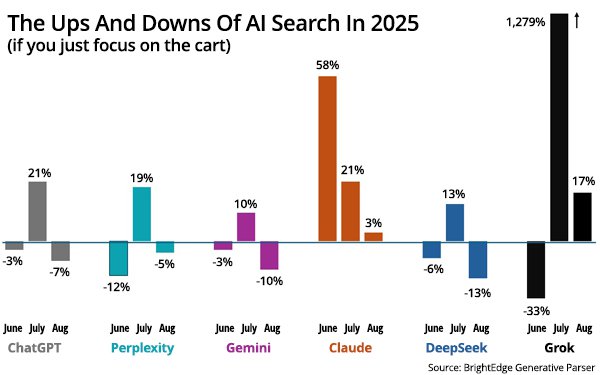
BrightEdge's data gives the industry
a reality check -- showing that AI search has seen double-digit growth, but only accounts for less than 1% of referral traffic when compared with organic search, which remains the primary
driver to publisher websites and delivers stronger conversions.
Here's why AI search owns the research phase of the purchase process, and why traditional search still owns the
conversions.
The research, which spans between January and August 2025, shows a distinction between growth and business impact.
AI search referral traffic shows sharp declines for
DeepSeek, for example, while Anthropic’s Claude grew 58% in July and 21% in August.
xAI’s Grok in July achieved 1,279% growth, compared with 17% in August.
Analyzing
website referral traffic during the past three months, ChatGPT significantly outpaces all competitors, according to BrightEdge.
advertisement
advertisement
BrightEdge CEO Jim Yu makes an important distinction that AI
search functions as a research channel, not a conversion channel, with near-zero direct conversions tracked.
Growth and business impact are different. While AI search captures headlines
with its explosive growth rates, BrightEdge data reveals that organic search remains the primary driver and delivers significantly stronger conversions. AI's referrals are not yet contributing.
Yu suggests marketers should not abandon proven SEO strategies for shiny new AI tools, and suggests taking a dual approach by optimizing for AI discovery and continuing to support fundamentals of
organic search.
It appears that Google and Bing, two of the largest traditional search engines, are also not ready to give up the fundamentals.
Yu explains that AI search users enter
the funnel at the research stage, asking questions and gathering information to inform their decisions. They want to gain more information, but are not yet ready to complete the transaction.
Organic search users demonstrate clearer purchase intent, often searching for specific products, services, or solutions. They know what they want and are closer to conversion.
One of the
most interesting points Yu makes in a research note is that while many users begin with AI-powered research, they ultimately convert through organic search or direct channels. It makes AI search
valuable for top-of-funnel discovery despite its lack of direct conversions.
AI search does not drive direct conversions today, but it matters for two critical reasons. It is growing at
unprecedented rates and creating new touchpoints with potential customers.
It owns the research phase of the purchase process by influencing decisions that lead to conversions through other
channels. The most successful marketers are not choosing one channel over the other, but are adopting both.